ROBERT WILLIAMS BUCHANAN (1841 - 1901)
|
ROBERT WILLIAMS BUCHANAN (1841 - 1901) |
|
|
|
|
|
|
|
|
RANDOM LETTERS
From time to time Buchanan’s letters turn up on ebay and other sites. They tend to be single sheets - brief notes with incomplete dates and no clue given as to the source - although the most infuriating examples are those where the signature alone is offered for sale, ripped from the bottom of the letter. This page is reserved for these randomly acquired letters. Where possible I have added additional information after the transcript. Since I’m working off the photos supplied by ebay, etc., it’s sometimes difficult to make out every word - my ‘best guesses’ are in italics and when I am completely at a loss there is a ? . _____
This first letter is not from ebay, it’s a transcription of a letter from Buchanan to William Hepworth Dixon (editor of The Athenæum) which I came across in the James Macfarlan section of the Gerald Massey site. Presumably it accompanied Buchanan’s piece on Macfarlan which was published in The Athenæum on 22nd November, 1862, which I have placed in the Letters to the Press section. I have to thank Ian Petticrew (webmaster of the Gerald Massey site) for letting me include the letter here:
Nov. 14, 1862. Dear Mr. Dixon, To procure insertion of the enclosed in the Athenæum, I think that it will only be necessary to point out two or three facts. Macfarlan’s little books have received highly favourable notice in your columns; Macfarlan himself was an object of interest to very many discerning men, including Mr. Dickens; and the poor fellow’s widow & child are nearly, if not absolutely, starving! It is important that the case should be noticed at once. Very faithfully Hepworth Dixon Esq. ] |
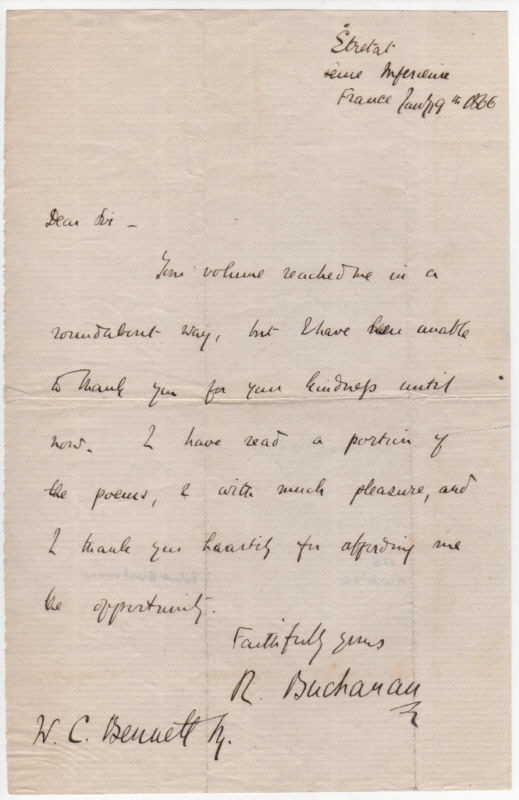 |
|||||||
|
To W. C. Bennett - 19th January 1866. ÉtretatSeine Inferieure France Janry 19th 1866 Dear Sir, Your volume reached me in a roundabout way, but I have been unable to thank you for your kindness until now. I have read a portion of the poems, & with much pleasure, and I thank you heartily for affording me the opportunity. Faithfully yours W. C. Bennett Esq.
[This letter, from the David J. Holmes Autographs site, was listed on ebay in December, 2010 (with accompanying photo). |
|||||||
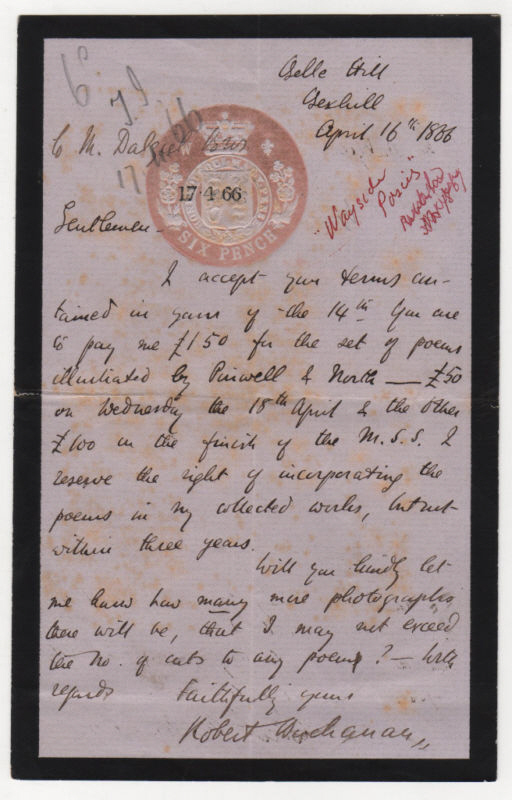 |
|||||||
|
To the Brothers Dalziel - 16th April 1866. Belle Hill Gentlemen, I accept your terms contained in yours of the 14th. You are to pay me £150 for the set of poems illustrated by Pinwell & North—£50 on Wednesday the 18th April & the other £100 on the finish of the M.S.S. I reserve the right of incorporating the poems in my collected works, but not within three years. Faithfully yours [Another letter from the David J. Holmes Autographs site. The description mentions the letter is written “on pale blue mourning paper” (hence the black border) - Buchanan’s father died the previous month on 4th March.] |
|||||||
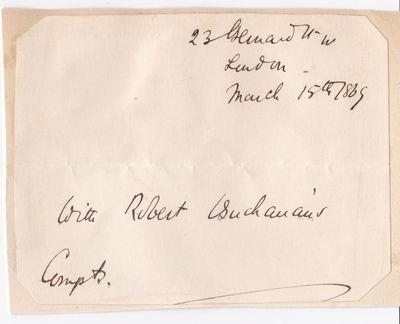 |
|||||||
|
Compliments slip - recipient unknown - 15th March 1869 23 Bernard St
With Robert Buchanan’s Compts.
|
|||||||
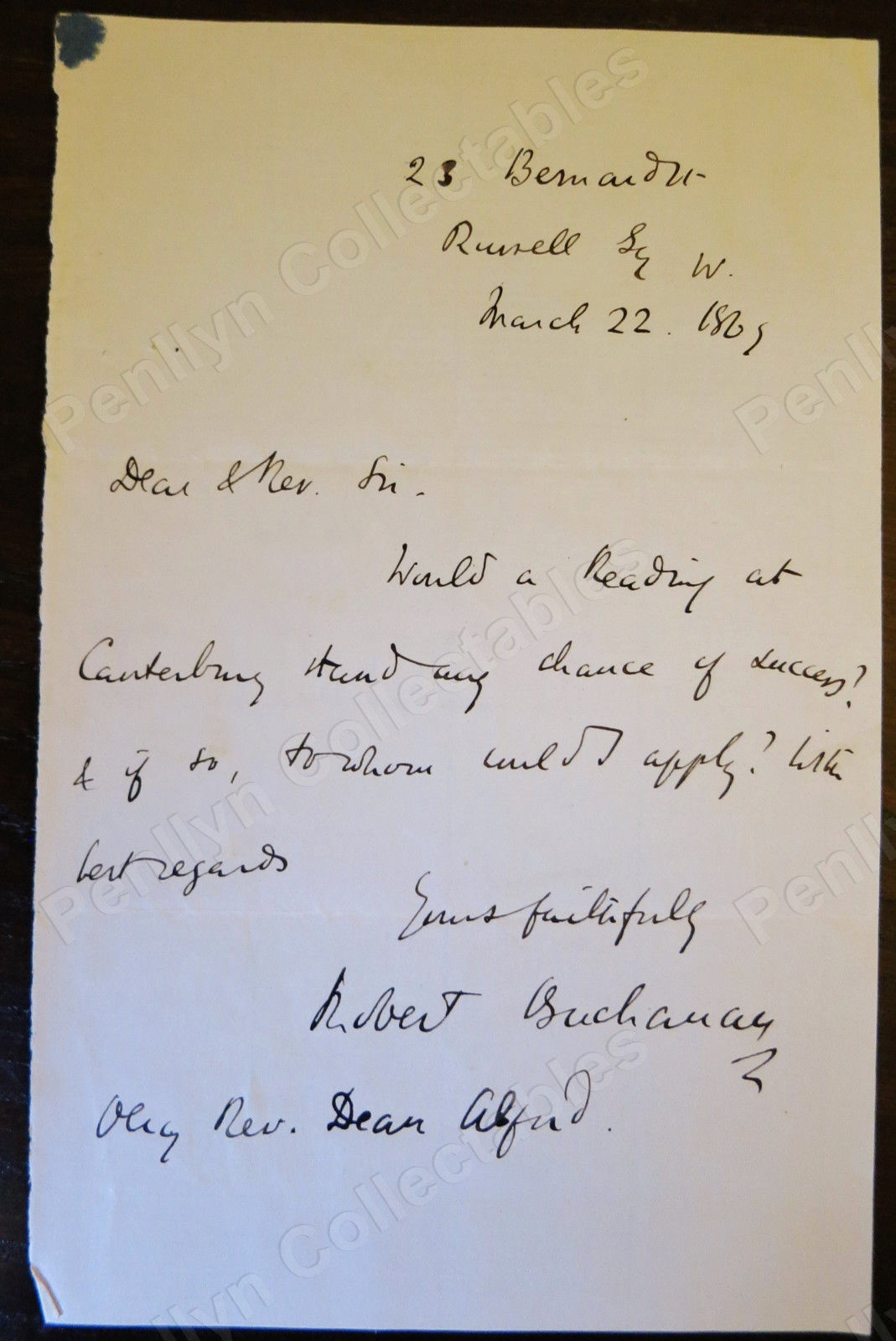 |
|
To the Rev. Dean Alford - 22nd March 1869. 23 Bernard St Dear & Rev. Sir, Would a Reading at Canterbury stand any chance of success? & if so, to whom could I apply? With best regards Very Rev. Dean Alford. [Henry Alford was the Dean of Canterbury (1857-71). This letter does indicate that Buchanan was still considering Public Readings of his poetry several weeks after his second London reading on 3rd March, 1969.] |
|||||||||||||||||||||
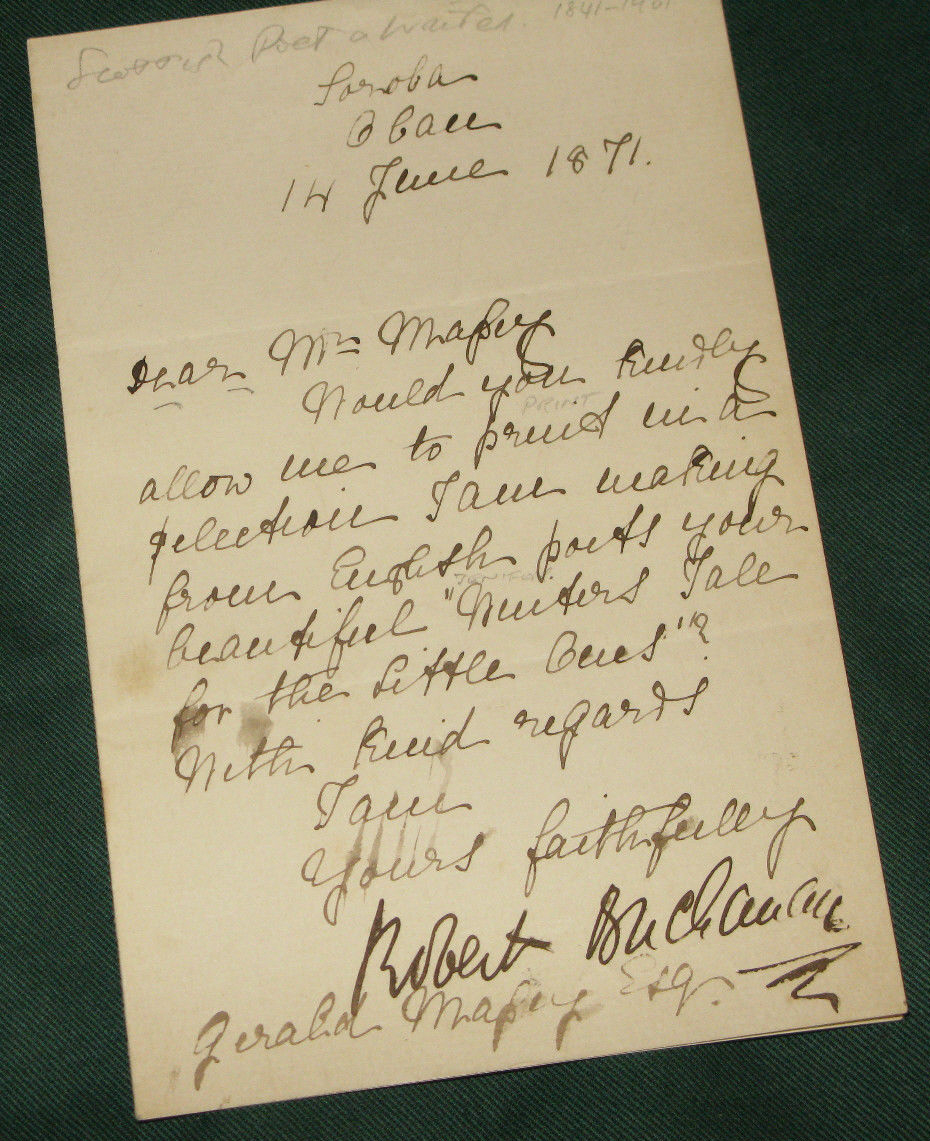 |
|||||||||||||||||||||
|
To Gerald Massey - 14 June 1871. Soroba Dear Mr Massey Would you kindly allow me to print in a selection I am making from English poets your beautiful “Winters Tale for the Little Ones”? I am Gerald Massey Esq.
[Buchanan wrote a similar letter on the same date to Robert Browning asking for permission to include “in a selection of poems from Homer downwards” several poems by Browning and Elizabeth Barrett Browning. I’ve not come across any other mention of this proposed anthology. Judging by the poems he was considering, it would seem that it was to be aimed at younger readers. More information about Gerald Massey is available here, including his poem ‘A Winter’s Tale for the Little Ones’.] |
|||||||||||||||||||||
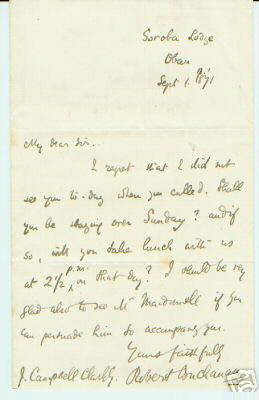 |
|||||||||||||||||||||
|
To J. Campbell Clark - 1st September 1871. Soroba Lodge My dear Sir, I regret that I did not see you to-day when you called. Shall you be staying over Sunday? and if so, will you take lunch with us at 2½ p.m. on that day? I should be very glad also to see Mr Macdonnell if you can persuade him to accompany you. Yours faithfully J. Campbell Clark Esq. |
|||||||||||||||||||||
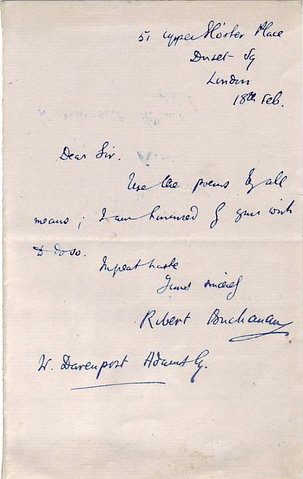 |
|||||||||||||||||||||
|
To William Davenport Adams - 18th February [1878]. 51 Upper Glo’ster Place Dear Sir, Use the poems by all means; I am honoured by your wish to do so. In great haste W. Davenport Adams Esq.
[This letter is from the Historical Autographs site. A search for William Davenport Adams (1851-1904) led to Princeton University Library which has a collection of similar letters to Adams and the following information: The collection “Consists of 71 letters from several well-known British authors and poets addressed to William Davenport Adams and to his wife. They are mainly responses to requests made by Adams to grant him permission to either publish some of their works or to quote them in his various dictionaries of English literature and authors. Some of the prominent correspondents names include Aubrey De Vere, Francis Hastings Doyle, Emily Faithfull, Norman Gale, Joseph Hatton, Lucas Malet, William Hurrell Mallock, Charles Marriott, Robert Bright Marston, Gerald Massey, Sir Lewis Morris, Sir Walter Alexander Raleigh, Sir George Otto Trevelyan, William Watson, and William Aldis Wright.” “William Davenport Adams was a British journalist and author, son of William Henry Davenport Adams. He was an editor of provincial papers, and a dramatic critic from 1878 to 1904. He compiled an unfinished Dictionary of the Drama (1904) and other literary works, such as Dictionary of English Literature: Being a Comprehensive Guide to English Authors and Their Works, With Poet and Player: Essays on Literature and the Stage, and Latter Day Lyrics: Being Poems of Sentiment and Reflection by Living Writers.” He died on 26th July, 1904 and an obituary from The Globe (27 July 1904 - p.4) is available here. It would appear that this letter relates to Latter Day Lyrics: Being Poems of Sentiment and Reflection by Living Writers (available at the Internet Archive), which was published by Chatto and Windus in 1878, since it contains three poems by Buchanan: ‘Charmian’, ‘"O bairn, when I am dead"’ and ‘The Footprints’. After Buchanan had moved to Ireland in the autumn of 1873, he seems to have used rooms in Gloucester Place for his visits to London and there are letters to Browning from this address from 1874 to 1878. So it is most likely that this letter was written in 1878. Adams had previously published two of Buchanan’s poems in his 1873 anthology, The Student’s Treasury of English Song, ‘Up In An Attic’ and ‘The City of the Future’ (from Napoleon Fallen). The latter was described in a review of the anthology in The Aberdeen Journal of 17th December, 1873, as “not poetry at all.”] |
|||||||||||||||||||||
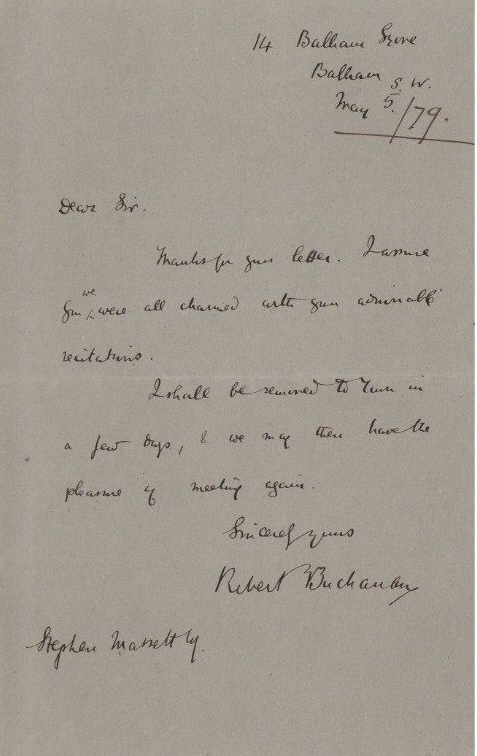 |
|||||||||||||||||||||
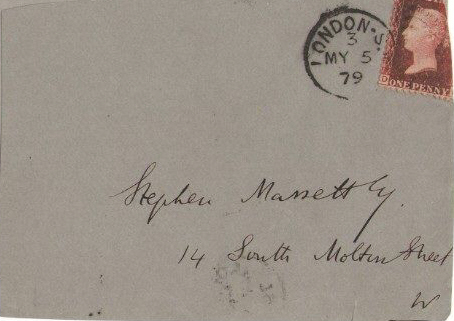 |
|||||||||||||||||||||
|
To Stephen Massett - 5th May, 1879. 14 Balham Grove Dear Sir, Thanks for your letter. I assure you we were all charmed with your admirable recitations. Sincerely yours Stephen Massett Esq.
[‘/79.’ is added to the date on the letter, but appears to be in another hand. The year is confirmed on the envelope and by the fact that Stephen Massett was in England at this time and was giving public performances. Below is a review of his performance at the Literary Institute of Wellingborough from The Northampton Mercury (5 April, 1879 - p.8). |
|||||||||||||||||||||
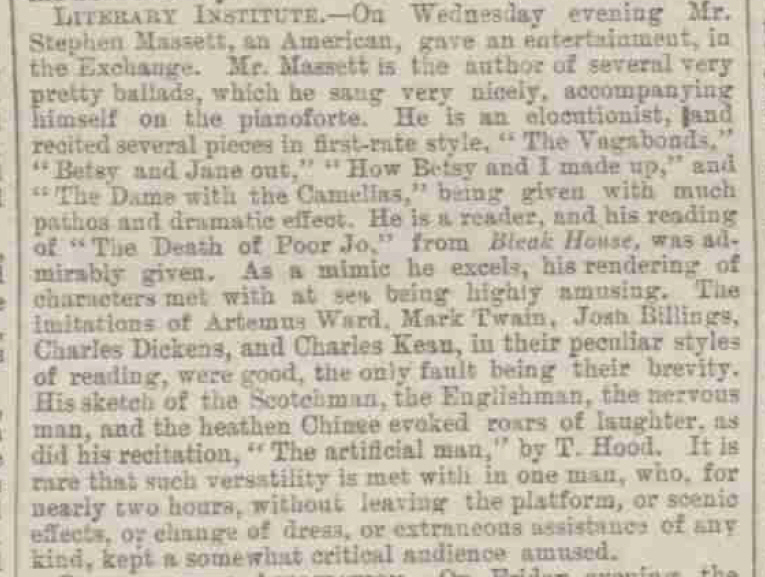 |
|||||||||||||||||||||
|
He was also on the bill of a charity concert at the St. George’s Hall, Langham Place, held on 3rd June, 1879, according to an advert in The Morning Post of 22nd May. Stephen Massett (also known as ‘Jeems Pipes of Pipesville’) was an English entertainer who made his name in America. More information is available at The Maritime Heritage Project.] |
|||||||||||||||||||||
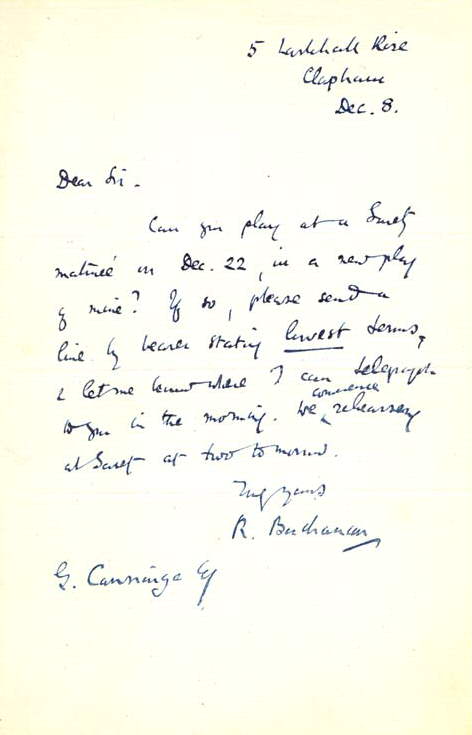 |
|||||||||||||||||||||
|
To George Canninge - 8th December [1880]. 5 Larkhall Rise Dear Sir, Can you play at a Gaiety matinée on Dec. 22, in a new play of mine? If so, please send a line by bearer stating lowest terms, & let me know where I can telegraph to you in the morning. We commence rehearsing at Gaiety at two to-morrow. Truly yours G. Canninge Esq.
[This letter to George Canninge, the actor, is almost certainly regarding Buchanan’s production of his play, The Nine Days’ Queen, which was premiered at a matinée at the Gaiety Theatre on December 22nd, 1880. There is a review of the performance (with Harriett Jay in the role of Lady Jane Grey) in the Theatre Reviews section.] |
|||||||||||||||||||||
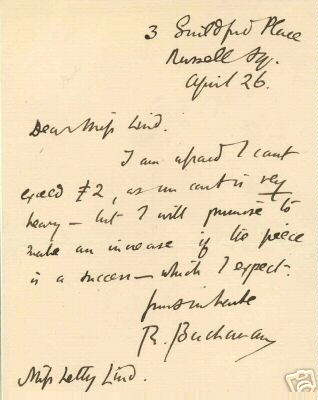 |
|||||||||||||||||||||
|
To Letty Lind - 26th April [1881]. 3 Guildford Place Dear Miss Lind, I am afraid I cant exceed £2, as our cost is very heavy — but I will promise to make an increase if the piece is a success — which I expect. Yours in haste Miss Letty Lind.
[I originally thought this was connected to Letty Lind’s appearance in The Bride of Love in 1890, however I now believe it is earlier, and refers to Miss Lind’s appearance as Anna Maria Clewson in The Mormons, which played at the Olympic Theatre from 7th May to 2nd June, 1881. According to the 1881 census, held on 3rd April, Buchanan and Harriett Jay were living at the lodging house of George Remnant at 3 Guildford Place, St. Pancras.] |
|||||||||||||||||||||
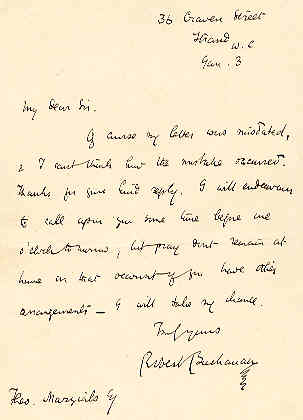 |
|||||||||||||||||||||
|
To Theophilus Marzials - 3rd January [1883]. 36 Craven Street My Dear Sir, Of course my letter was misdated, & I cant think how the mistake occurred. Thanks for your kind reply. I will endeavour to call upon you some time before one o'clock to-morrow, but pray dont remain at home on that account —if you have other arrangements—I will take my chance. Truly yours Theo. Marzials Esq.
[I couldn’t add much information to this letter, and was not even sure of the year in which it was written, until Helen Assaf sent me the item below which she found in an old (very old considering it went for ten bob) Sotheby’s catalogue: |
|||||||||||||||||||||
 |
|||||||||||||||||||||
|
Although Buchanan’s main association with the Adelphi came later in his career with the successful run of plays written with G. R. Sims, at that time he was settled at Maresfield Gardens. However, an earlier play, Storm-Beaten, was produced at the Adelphi on 14th March, 1883, and at that time, Buchanan’s mother was a resident at the Westward Ho boarding house in Southend. Therefore, I would suggest that these two letters are from 1883, as well as one of the letters to Andrew Chatto - the only other letter I’ve come across with the Craven Street address (which, by the way, is just off the Strand, around the corner from the Adelphi). According to reviews, the music for Storm-Beaten was written by Henry Sprake, with a ‘pastoral ballet’ by Henri Dewinne. However, an advert for the play in Reynolds’s Newspaper of 4th March mentions a “part song by Margials” (sic) and the review in The Stage concludes with the following: Towards the end of 2018 I acquired copies of several Buchanan letters from UCLA - one of which was the ‘Westward Ho’ letter to Theo. Marzials. This is available here, along with some speculation about the connection between the two letters and their dates. Further information about Theophilus Marzials (1850-1920) is available on wikipedia.] |
|||||||||||||||||||||
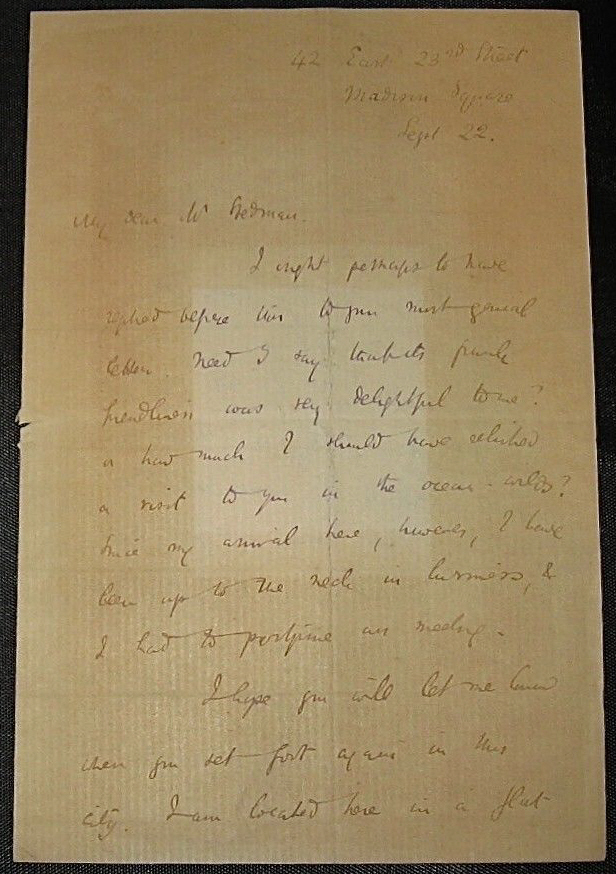 |
|||||||||||||||||||||
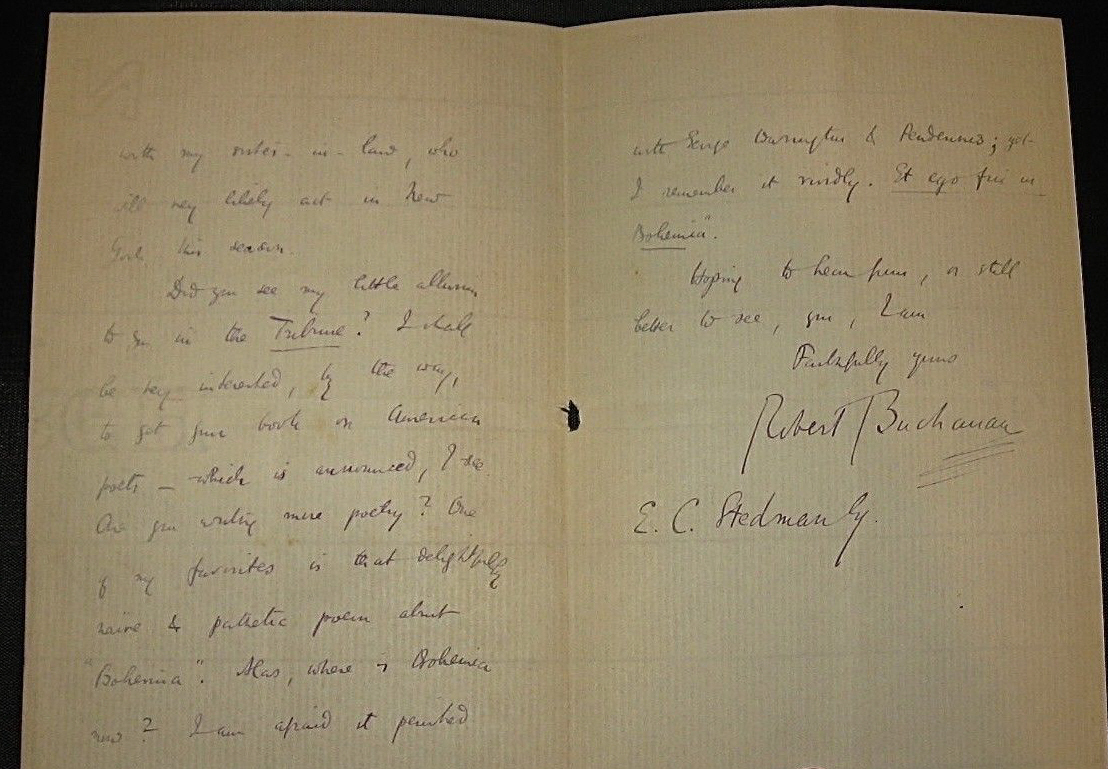 |
|
To Edmund Clarence Stedman - 22nd September [1884]. 42 East 23rd Street My Dear Mr Stedman, I ought perhaps to have replied before this to your most genial letter. Need I say that its frank friendliness was very delightful to me? or how much I should have relished a visit to you in the ocean-wilds? Since my arrival here, however, I have been up to the neck in business, & I had to postpone our meeting. Faithfully yours E. C. Stedman Esq.
[This letter to the American writer Edmund Clarence Stedman was offered for sale on ebay in October, 2014 (for $299.99) with a first edition of The Martyrdom of Madeline which had been given to Stedman by Robert Buchanan. There is an inscription on the title-page of Volume 1 which reads: To E. C. Stedman, Paris, June 2. 1882. The description of the item was as follows: |
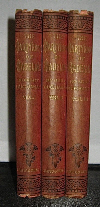 |
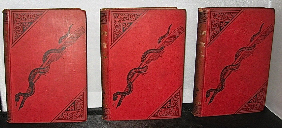 |
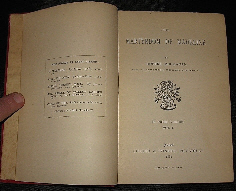 |
||||||
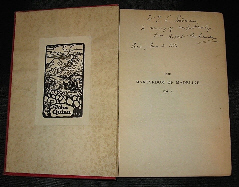 |
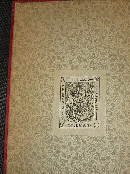 |
|||||||
|
E. C. Stedman refers to his meeting with Buchanan in Paris in a letter to Hall Caine, which is included in Life and Letters of Edmund Clarence Stedman Vol. 2 by Laura Stedman and George M. Gould, M.D. (New York: Moffat, Yard and Company, 1910): (pp. 38-40) To T. Hall Caine. ___
There is another mention of Buchanan in the same book, in a letter to Lilian Whiting, which I thought I might as well add here: (pp. 348-349) To Lilian Whiting. _____
|
|
|
|
|
|
|